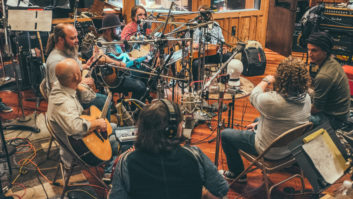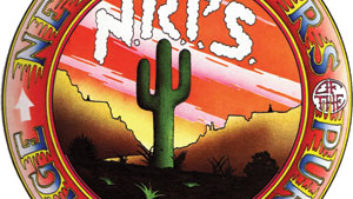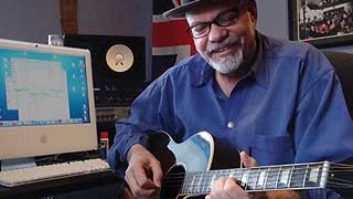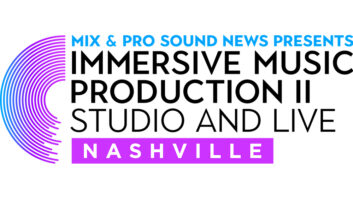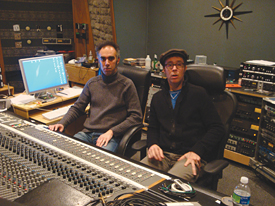
Engineer Joe Costa (left) and Ben Folds mix a cappella recordings on the Neotek Elite console at the studio formerly known as Javelina.
Someone sent Ben Folds a YouTube link.
It was cool: An a cappella group from Columbia University, doing Folds’ song, “Still Fighting It.” And Folds thought, “Wow, these kids go to the same school and sing that well together… that must be really unusual.”
Then there was the YouTube link for “related videos,” and Folds clicked on it. And “unusual” became less so. There were at least 100 versions of Folds’ songs out in a cappella world. He set up a contest, asking for submissions of groups doing his songs, with plans to make an album. And he and engineer Joe Costa began lugging equipment to schools that had a cappella groups that seemed to have a shot at making the final cut.
“We did a lot with ribbon mics, ’cause it’s neat-sounding and it’s noisy,” says Costa, Folds’ engineer at what used to be called Javelina Studios on Music Row. “Ben was saying it was like field recording. At first, we tried to put them in sections, with the baritone people together and the tenors together. They were cool with that, but it didn’t sound good. The only thing we did in the end was put the bass people together, in the middle, and have everybody else stand in a horseshoe formation. The recordings are noisy, but that’s part of the charm.”
The recordings in question, augmented by a couple of tracks featuring Folds and friends doing their best, overdubbed imitation of an a cappella choir, can be found on an album called Ben Folds Presents: University A Cappella!, out April 7. What Folds and Costa initially thought of as a fun and easy-ish side project wound up being both trickier and more rewarding than expected.
Folds and Costa schlepped to various colleges, hauling four API preamps that kept getting damaged in the airline baggage process. Oh, at first they used a pair of solid-state Universal Audio 2108 pre’s, which got smashed. They recorded onto a laptop, using a Digidesign Digi 003 system. One group came to Javelina to record (“Because we were sick of traveling,” Folds says), assembling in the huge tracking room and singing, while Costa captured the sounds through an AEA R88 stereo ribbon microphone, an AEA TRP Ribbon Pre, a couple of condenser mics and a Coles ribbon mic for the bass singers. The entire album was mixed on a Neotek Elite console at Javelina.
“When we bought this console, we were going to use it as a monitor console,” Folds says. “But we wound up really loving it. Michael Brauer has been mixing my records for five years, and this is his favorite board. He says it’s got a great midrange and it’s really open, and he about breaks the desk when he’s jumping up and down on it.”
Aside from attempting to keep equipment from airport harm, the biggest challenge came when it came time for Folds to emulate the a cappella sounds on his own. “For one of the two songs I did, it took about 30 hours to arrange and another 30 hours of multitracking,” he says. “I totally underestimated the amount of time I had to put into it. I do vocals in the studio all the time, and sometimes you get to the eighth take and it’s still sucking. These kids are getting it on the first try.”
Folds brought in bass player (and deft harmony vocalist) Jared Reynolds to help with the overdubs, and they called in others, including Webb Wilder, for the bass parts. In the recording process, they learned something about recording vocal choruses without instrumental backing.
“I found out that everyone can’t be in perfect tune,” Folds said. “It doesn’t sound right. Country music sounds wack enough when it’s all tuned, but you’re used to hearing that. When you hear a bunch of voices and all of a sudden they’re Tronned out, it’s really weird. On one of the songs, we tuned the bass at first, and by itself it sounded great. With everyone else, it sounded sharp. We brought a guy in from Belmont University to sing bass, and I noticed he was singing flat. I didn’t think it would work, but it worked perfectly. We finally realized that people have a natural way of wanting to harmonize, and it’s not even locked in tune.”
Folds has leased Javelina for more than five years now. Historically, the studio was a complementary room to RCA Studio B, and its immense tracking space was often used for string sections. Elvis Presley, Carl Perkins, Charley Pride and others worked at Javelina. Of late, it’s been a private sonic playground, with Folds’ many pianos crowding the floor. But Folds is planning to open it back up for strings and other appropriate uses.“This is an amazing room, but it’s been an amazing storage room for too long,” Folds says. “We’re going to clean it up and do the occasional session here, so that it retains some dignity and doesn’t just get used as a big rehearsal space.”
Folds looks around that space and smiles on a recent afternoon, considering the music that had just been mixed on the Neotek. “There are hundreds of colleges and universities that have two or three of these a cappella groups,” he says. “Some suck, but a lot don’t. In a world where everything’s tuned, and everything goes to MP3s, that this social musical event is rising out of the ashes says something for the human spirit. I’m even more determined that music is something everyone can do, and that it’s a normal part of being human. I think this is a power-to-the-people kind of record. And I think it’s important.”
Reach Nashville Skyline by emailing
[email protected].
